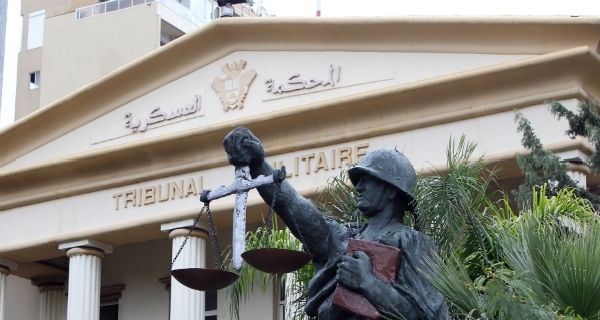Permanent Military Court Will it be dissolved or retained?
Military Judiciary Courts
According to Law no. 24/68 dated April 12, 1968 and its amendments, the military judiciary consists of:
A Beirut-based Military Court of Cassation that is considered the highest judicial authority in the military judiciary and is tantamount to the Criminal Court of Cassation. Its rulings are irrevocable and it is presided over by a judge who has been agreed to be a Maronite and four army officers holding the rank of Lieutenant Colonel or above.
A permanent military court located in Beirut and consisting of two chambers. It is tantamount to the Court of Appeals in the juridical judiciary and is chaired by a Lebanese Army officer holding the rank of Lieutenant Colonel or above and consists of four members: three officers and a judge from the juridical judiciary. By convention, the president of the court has been agreed to be a Shia’a.
Single military judges in the Mohafazas.
A government commissioner and his aide. The former is to be a Maronite by convention and the latter is to be a Sunni.
Investigative judges. The first investigative judge has been agreed to be a Druze.
Military Courts investigate the following crimes:
Crimes of treason, spying and illegitimate connections with the enemy.
Crimes related to weapons and war ammunitions.
Crimes committed in the military camps, institutions and barracks.
Crimes committed against a military member.
Crimes committed against members of the Lebanese Army, Internal Security Forces, General Security and State Security.
All crimes, whatever their nature, that jeopardize the interest of the Lebanese Army or the allied armies.
Crimes related to the law on boycotting Israel.
Who is tried before the Military Court?
Serving military members in the institutions of the National Defense Ministry and members of the reserve.
Military members of the Internal Security Forces, General Security and State Security
Members of Customs Police
Military members of foreign armies and civilian employees within the said armies
Civilian employees in the institutes affiliated with the National Defense Ministry, the Internal Security Forces, the General Security and the State Security for crimes associated with their jobs
Prisoners of wars
Any perpetrator, accomplice, intervener or instigator involved in a crime referred to the military judiciary.

Most significant cases and sentences by the Military Court:
Over the past few years, the Military Court has passed several verdicts, some of which have been greeted with a public backlash including the following:
The case of collaboration with Israel against members of Antoine Lahad’s Army and the citizens, who after fled to Israel after its withdrawal from the Lebanese territory and later returned to Lebanon. Some believed that the Military Court’s sentences were lenient as they vacillated between one and several years in prison.
The Samaha case where former Minister and MP Michel Samaha transferred explosives from Syria to Lebanon. Before the appeal, the Military Court sentenced Samaha to four years and a half in prison and stripped him of his civil rights, particularly his right to vote or to run for elections.
The still ongoing trial of the detainees in the Abra clashes between the supporters of Sheikh Ahmad El-Assir and the Lebanese Army.
The sentence in the case of Lieutenant Colonel Fayez Karam, a member of the Free Patriotic Movement allied with General Michel Aoun and accused of spying for Israel. Karam was sentenced to three years in prison, a sentence later commuted to two years.
Sentences against axis leaders in Tripoli.
Some of the ordinary verdicts issued by the Military Court:
An in-absentia sentence issued against the crime of entry into the enemy’s territories without permission and the acquisition of the Israeli citizenship. The sentence stipulated ten years of hard labor in prison, a fine of LBP 1 million and a deprivation of civil rights.
An in-absentia sentence issued against the crime of carrying an unlicensed military handgun and resisting the army members. The sentence stipulated one year and a month in prison, a fine worth LBP 100,000 and the confiscation of the seized weapon.
Sentencing a military member to ten days in prison for the deliberate loss of his handgun due to neglect.
Sentencing a military member to two weeks in prison for disobeying military instructions and leaving his weapon in the vehicle, which resulted in the loss of his weapon.
Justice Minister Ashraf Rifi’s stance after the Military Court’s verdict in the Samaha case on May 13, 2015:
“I declare to the Lebanese people the death of the Military Court. This is yet another black day in the history of this court. The Lebanese still recall the sentence against the agent Fayez Karam. The Ministry of Justice has nothing to do with this court and will spare no legal means to appeal against its ruling, which convicts all those who helped issue it. We will therefore do the utmost possible to amend the Military Court’s regulations. We are currently finalizing our alternative proposition which will help us eliminate special courts and instead set up specialized ones.”








Leave A Comment